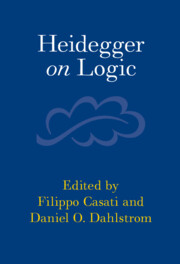Book contents
- Heidegger on Logic
- Heidegger on Logic
- Copyright page
- Contents
- Contributors
- Acknowledgments
- Method of Citation
- Introduction
- Part I Normativity, the Phenomenology of Assertions, and Productive Logic
- Part II Language, Logic, and Nonsense
- Part III Paradox, the Prospects for Ontology, and Beyond
- Part IV Logical Principles and the Question of Being
- Chapter 11 The Resonant Principle of Reason
- Chapter 12 Heidegger’s Contradictions
- References
- Index
Chapter 12 - Heidegger’s Contradictions
from Part IV - Logical Principles and the Question of Being
Published online by Cambridge University Press: 15 September 2022
- Heidegger on Logic
- Heidegger on Logic
- Copyright page
- Contents
- Contributors
- Acknowledgments
- Method of Citation
- Introduction
- Part I Normativity, the Phenomenology of Assertions, and Productive Logic
- Part II Language, Logic, and Nonsense
- Part III Paradox, the Prospects for Ontology, and Beyond
- Part IV Logical Principles and the Question of Being
- Chapter 11 The Resonant Principle of Reason
- Chapter 12 Heidegger’s Contradictions
- References
- Index
Summary
After unpacking the sense in which Heidegger uses the term "contradiction," the chapter reviews his use of it in the strictly logical, “injunctive” sense as the “principle of non-contradiction” (PNC) and “law of thinking,” particularly as he wields it in the course of exposing what otherwise appear to be cases of vagueness or ambiguity. It then reviews his tendency in some contexts to align the PNC with a metaphysics that restricts being to being on hand (vorhanden) and the dilemma that this ontological interpretation presents, given his apparent adherence to the principle, even as he proposes a broader understanding of being. The chapter then suggests that his analysis of attunement in the 1929/30 lectures introduces a more expansive reading of the PNC and that this reading is corroborated by his existential interpretation of the principle in the Winter Semester of 1933/34. The interpretation is a ringing endorsement of the PNC and the sameness of reference it enjoins as a condition for being-with-one-another. The chapter concludes by probing the implications of this ontologically broader – or post-ontological – interpretation of the PNC for thinking and speaking of being itself, riddled with “nothingness” as it is.
Keywords
- Type
- Chapter
- Information
- Heidegger on Logic , pp. 240 - 258Publisher: Cambridge University PressPrint publication year: 2022
- 1
- Cited by

